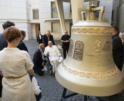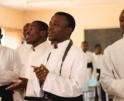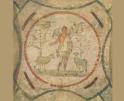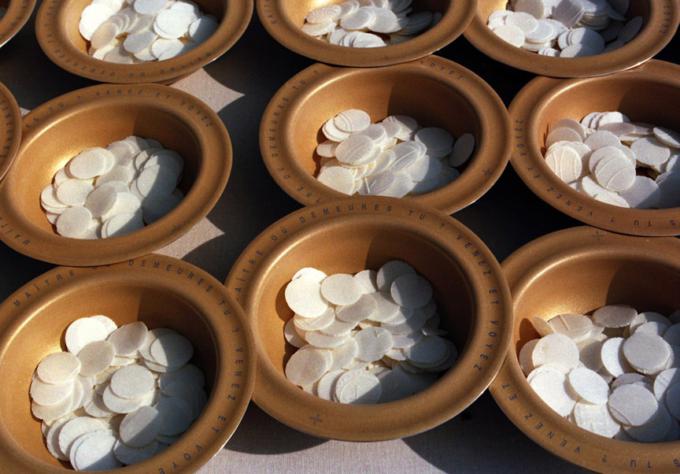
Faith
But the truth is, the Eucharist is food for all the days of our lives -- sustenance that brings the flesh and blood reality of the Incarnate God, the Lord Jesus Christ, into our very veins and sinews for our spiritual, physical and yes, mental well-being.
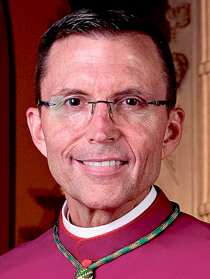
Reed
It took my teacher Sister Lydia probably 90 seconds to tell us the story of St. Tarcisius. It was a moment in time, but I have never forgotten that story because I was very impressed.
During the third century, Christians had to meet secretly to avoid persecution. A boy named Tarcisius (as a child hearing this, I imagined him to be my age, perhaps a little older), volunteered to take the holy Eucharist to Christians in prison. On his way there, he was recognized by a group of friends who invited Tarcisius to play in their games. Knowing that he was a Christian and curious about what Tarcisius carried, the gang of boys tried to pry it from the fold of the garment in which he'd been holding it. At some point, the group of boys evolved into an angry mob that overcame Tarcisius, who went down under their blows. He died as he was being carried away, with viaticum -- food for his journey home -- still clutched to his chest.
Through Sister's telling that brief story, this little kid sitting near the back of classroom 1-A learned that belief in Jesus' true presence in the Eucharist goes back to the earliest days of Christianity -- and has always been worth defending -- and that for God, heroism, holiness and love for the Eucharist has never been exclusively reserved to adults only. Young girls and boys, too, are capable of loving Jesus so much that they would die for him. Age has never been a barrier to holiness.
"Viaticum" is a Latin word meaning, literally, "provisions for the journey," and the word itself was more commonly used in connection with the offering of Last Rites -- in the sacrament of extreme unction, after the last anointing and prayers for a person dying or in danger of death. The "provisions" given for that final exercise of life are nothing less than the precious body and blood of the Lord Jesus. The merest crumb of the sacred Host, or the merest drop of the precious blood, contains Christ entire, and this Communion is meant to provide the spiritual sustenance necessary for the soul's passage to encounter God and receive both his justice and his mercy.
But the truth is, the Eucharist is food for all the days of our lives -- sustenance that brings the flesh and blood reality of the Incarnate God, the Lord Jesus Christ, into our very veins and sinews for our spiritual, physical and yes, mental well-being.
What a tremendous gift Jesus left for us in this most Blessed Sacrament! How incredibly fortunate are we to know that God is this close to us -- that he feeds us with himself, the living bread come down from heaven. When we pass near the tabernacle, and certainly when we receive him at Mass or in a sickbed, we are as close to heaven on earth as possible. It is the bread of angels we consume, a mystery we grasp only with faith's consent.
The Fathers of the Second Vatican Council taught that the Eucharist is the "source and the summit of the Christian life." In other words, for a life to be truly Christian, Jesus in the Eucharist is meant to be not merely a part of a person's existence but the reality from whom everything in her or his life flows -- and the goal toward whom everything in this life moves.
And so, as we make this arduous journey together, we rely on this heavenly food. Can we survive without Jesus on Sunday? How about today?
"Give us this bread always," the crowd said to Jesus. And then he declared, "I am the bread of life ... whoever comes to me will never be hungry; whoever believes in me will never thirst" (Jn 6:34-35).
The holy Eucharist is true food for this challenging road; it is true consolation for the wounds we endure as we persevere. And so "viaticum" is a word worth reembracing within the practice of our faith, for its potent reminder that, like the young, put-upon Tarcisius, we walk this road with Jesus the Christ.
- Bishop Robert Reed is an auxiliary bishop of the Archdiocese of Boston, pastor of Sacred Heart/St. Patrick Church in Watertown and president of the CatholicTV network.
Recent articles in the Faith & Family section
-
How we fightJaymie Stuart Wolfe
-
In July, watch this blockbuster sci-fi and remember the battle!Bishop Robert Reed
-
Did you know?Father Robert M. O'Grady
-
Be a Lifeline for Mission Seminarians!Maureen Crowley Heil
-
One flockScott Hahn

